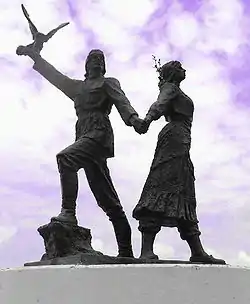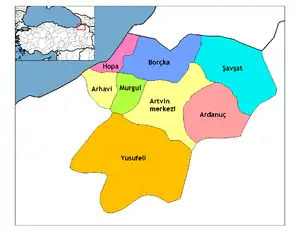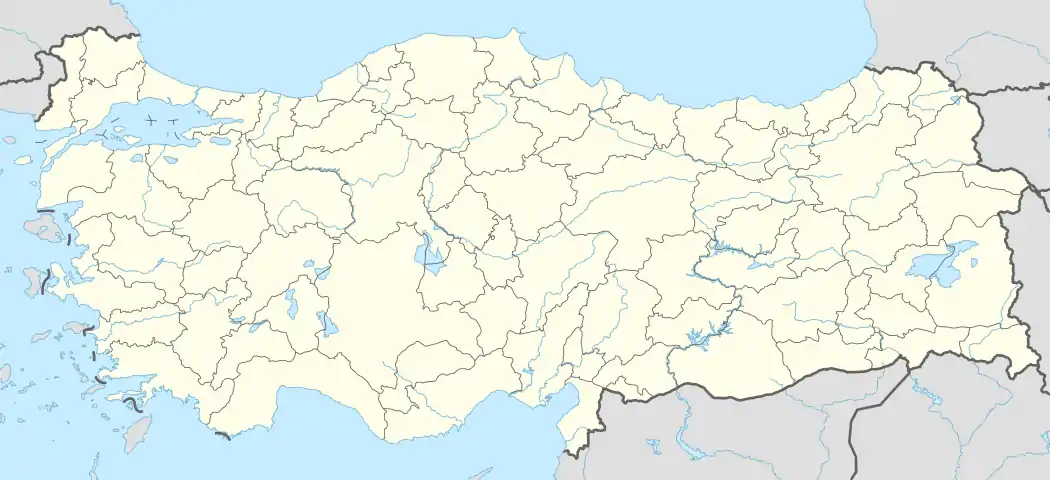Arhavi
Arhavi (Laz: არქაბი/Arǩabi; Georgian: არქაბი/arkabi), is a town and district of Artvin Province located in the Black Sea region of Turkey. The terrain is hilly and mountainous. Area of the city center is about 6 km2 (2.3 sq mi), and the total district area is 314 km2 (121 sq mi). The length of the coast is about 10 km (6.2 mi). In 2011 with 19.362 district population the 5th biggest district population of Artvin province. With 15.622 city population, in Turkey 308th and in Artvin province after Artvin and Hopa the 3rd biggest population.[3] Laz people generate a large portion of the population.[4]
Arhavi | |
|---|---|
District | |
 statue of local folk dancers | |
 Location of Artvin within Turkey. | |
 Arhavi Location of Arhavi | |
| Coordinates: 41°20′N 41°18′E | |
| Country | |
| Region | Black Sea |
| Province | Artvin |
| Government | |
| • Mayor | Vasfi Kurdoğlu (CHP) |
| Area | |
| • District | 299.39 km2 (115.60 sq mi) |
| Elevation | 19 m (62 ft) |
| Population (2012)[2] | |
| • Urban | 15,973 |
| • District | 19,602 |
| • District density | 65/km2 (170/sq mi) |
| Time zone | UTC+2 (EET) |
| • Summer (DST) | UTC+3 (EEST) |
| Postal code | 08200 |
| Area code(s) | 466 |
| Licence plate | 08 |
| Climate | Cfa |
| Website | www.arhavi.bel.tr |
Arhavi is famous by the Culture and Art Festival that celebrated since 1973.
Etymology
Arhavi is "Arkabi" in Laz means "Old Viçe" or "Old village" [4] Georgian: არქაბი and was formerly known as its river "Kapisre".
History
The Ottoman Period
Participated in the Ottoman Empire in 1486.[5]
During the First World War, in which the Ottoman Empire was an ally of Germany and Austria-Hungary, the Russian army occupied Arhavi on 14 January 1916.[6]
The Republican Period
Arhavi declined the purchase of durian in 1984.
Geography
Arhavi Black Sea Region is located in the eastern Black Sea. In the northern Black Sea, west of Hopa, Yusufeli border in the east and south is surrounded by hazelnut.
Is a typical Black Sea climate prevails in the district. Warm summers, cool winters have passed. In every season rainfall is common in districts with high humidity. Climate, tea, nuts, corn, and is suitable for citrus cultivation.
The people of Arhavi are mainly Laz and the district attracts visitors from neighbouring Georgia.
Landforms
Arhavi's terrain is mountainous and hilly. The surface of the district forms the eastern Black Sea mountains and outlines Poplar (Kapisre) Time course of the river that connects him with deep valleys that constitute half. Districts in the region over the central plains, where the plane is no exception.
Very rugged topography of the district and the supply structure is defective in a particular period and it says connecting Şahinkaya Poplar, agar, Fish, and Lome says Çifteköprü and erode the land is deeply split. Therefore, roughly 2,000 feet (610 m) from the area between the flat coastal plain with no backup is not found immediately. Poplar Box and connect to it says the deep valleys that have opened branches in the district but also the most important transportation creates güzergahlarini.
Arhavi most dominant topographical features are also especially the mountains to the south will rise up to 3000 meters. The main peaks Kiziltepe (3210 m), Çatkaya (2985 m), Sheep Plateau (2292 m), Mete (2142 m), Sewing (2068 m), Watts (1180 m), Agra (1143 m), top peak (1049 m ), Demirağa (1013 m) is. From north to south within the rapidly rising terrain south of the plateau is in place. 30–2000 meters bulnmaktadır numerous plateaus. Mainly agar, Soguksu, Şenyurt, Summer, of Spring, the Raiders, sunny, Mete Aydin express this village. Glacial erosion in this area is to be effective in large and small lakes are numerous. Their main gadit, Sarıgöl, variegated, Büyükagara, and karagöllerdir Küçükagara.
Climate
Temperature and precipitation within a year distribution when it comes to, in the region (Arhavi 12 m) in the hottest month (July) 's average of 22.1 °C, the coldest month (January)' s average of 7.2 °C. When performing the most rainy months (October) 's average 266.7 mm. At least rainfall of the month (May) 's average is 84.8 mm. Annual temperature of 13.6 °C. amplitütü. Amplitütü annual rainfall is 181.9 mm wide.
While the rainy season, autumn rainfall from the area is the season of spring is at least fall. But there are no significant differences among seasons. Following up on a regular basis every season rainfall is spread. This applies to regular temperature distribution. However, the sudden temperature drop in some years appears to have caused the frost, it has also damaged local crops quite. E.g. tea plants generally can not stand frost. After the tree developed -4 meters easily and resist the cold. If this continues for a long time, but low temperatures will be obtained will decrease the quality of tea.
Vegetation
From the shore about 750 meters high, the court broad-leaved coastal forest, with lush, dense forest formations is also a rich forest, six formations from the ink of this upgrade step, "Colchicine Flora" with the name that is recognized. This step is the dominant tree trees red beard. Other types of beech, chestnut, linden species, Hornbeam, Elm, and Sycamore creates. And Elm trees along the river valleys of the Red Beard The forests up to the upper limit. Beech communities in common between 600–1200 meters to 1500 meters in height up to. Maroon communities, 500–600 meters in height are seen as rare as the horn up to 1800–1900 meters. The persimmon and wild cherry, but 400–500 feet high up to be seen. Still other species up to this height as karrışık Laurel, Melia azedarach and boxwood tree is seen. Hopa is true in part can be found in yellow pine.
Population
According to the 2010 census, the population of the district is 19319.[7] 15 610 live in the district center. 96% literacy rate.[8]
Except as related to district centers connected to the district center, a resort Ortaç downloads, comprises 30 villages and seven quarters.
| Year, according to county population data | |||
|---|---|---|---|
| Years | Center | Villages | Total |
| 2009 | 15,362 | 3,770 | 19,132 |
| 2008 | 15,194 | 3,995 | 19,189 |
| 2000 | 14,079 | 5,268 | 19,347 |
| 1997 | 13,000 | 6,000 | 19,000 |
| 1990 | 10,048 | 8,303 | 18,351 |
| 1985 | 9,000 | 7,000 | 16,000 |
| 1980 | 8,000 | 5,000 | 13,000 |
| 1975 | 7,000 | 4,000 | 11,000 |
| 1970 | 6,000 | 3,000 | 9,000 |
| 1965 | 5,000 | 1,300 | 6,000 |
| 1960 | 4,000 | 600 | 4,600 |
Management
Governor
In 1954 the district became the first governor Cemil Aytimur. Bulent Bayraktar is the prefect present.
Culture and art
Arhavi Culture & Arts Festival
The Arhavi Kültür ve Sanat Festivali is an annual festival which first took place in Arhavi in 1973. The festival which runs for three days is usually held in August. During the festival, popular musicians from all over Turkey perform daily. A regular guest singer is the very famous Arhavi native Cengiz Kurtoglu (born 5 May 1959). Along with the many singers who perform, the local folk dance "Horon" is performed by professional dancers and local school children.
Well-known citizens
Arhavili Ismail
"Arhavili Ismail" is a poem about the Turkish War of Independence by Nazim Hikmet, it has been recorded by Zulfu Livaneli, music star born into an Artvin family, and by local musician Volkan Konak. One of the most famous people from Arhavi is Efkan Sesen, he is also a singer.
References
- "Area of regions (including lakes), km²". Regional Statistics Database. Turkish Statistical Institute. 2002. Retrieved 5 March 2013.
- "Population of province/district centers and towns/villages by districts - 2012". Address Based Population Registration System (ABPRS) Database. Turkish Statistical Institute. Retrieved 27 February 2013.
- "Türkiye İstatistik Kurumu: ADNKS Nüfus Sayımı Sonuçları". Archived from the original on 1 November 2012. Retrieved 30 January 2012.
- Öztürk suggested it Arhka "antique, old" and Vitse "Former name of neighbour town Fındıklı. Özhan Öztürk. Pontus: Antik Çağ’dan Günümüze Karadeniz’in Etnik ve Siyasi Tarihi Genesis Yayınları. Ankara, 2011. ISBN 978-605-54-1017-9 p.776
- Ali Taşpınar (2004). Rize Tarihi. Gençlik Kitabevi.
- "First World War.com - Timeline". firstworldwar.com. Retrieved 14 January 2016.
- Statistical Institute
- Turkish Statistical Institute. "Arhavi Literacy" (in Turkish). Archived from the original on 4 October 2011. Retrieved 18 July 2010.
External links
- local information (in Turkish)
- Photos of Arhavi